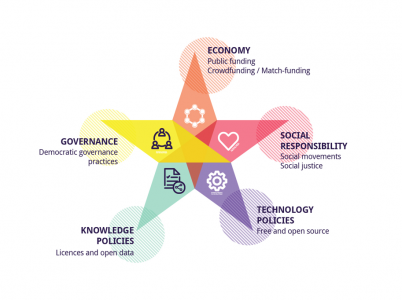Criterias
Background
The Smart Map wants to show the local sharing economy that most people don’t know about. On The Smart Map you can find what otherwise often goes unnoticed.
The criterias was originally developed by the civic non-profit organisation Collaborative Economy Sweden (KES, in Swedish Kollaborativ Ekonomi Sverige) in collaboration with the City of Gothenburg with inspiration from Procommons Collaborative Economy Analytical Framework. Since then they are updated democratically in the board meetings that KES and the licensing cities have four times a year.

The Criterias
Version 5.0 (Last updated September 25, 2023)
Facilitate access over ownership
This criteria is about visualizing things we can: rent, share, exchange, borrow and give/receive.
When it comes to resources such as time and knowledge, we list activities where the exchange of knowledge between the participants is at the center, which leads to reduced consumption and increased community.
Open do-it-yourself workshops where participants can carry out repairs themselves do not go under the category of repairers but under “facilitate access rather than ownership”, examples could be bike kitchens and makerspaces.
Public and public places are only shown if they offer access to features or things out of the ordinary — which usually come at a cost.
Facilitate reuse
This criteria is about making visualizing initiatives that make it easier to: buy used and to buy repair service, i.e. to extend the life of our things instead of buying new.
For businesses that both carry out repairs and sell used and newly produced items, repairs and used items are highlighted on the Smart Map.
Open to everyone
This criteria aims to counter discrimination and promote inclusion. Open to all means open regardless of gender, ethnic affiliation, sexual orientation, functional diversity and religion or other beliefs. However, a gender separatist activity is approved.
The same applies to age, for example activities aimed at children.
Not generally known or widely used
This criteria aims for the Smart Map to show the services and initiatives that are not widely known or that the majority use. This means that Smarta Kartan does not list businesses and services that the public can already be assumed to know about or that the majority use, an example of which is car repair shops.
ADDITIONS
Builds horizontal trust between people
This addition highlights initiatives that promote and build trust between people. Transactions between people can be done through an intermediary or directly, either digitally and/or physically. An example is an association where private individuals borrow other private cars and have direct contact with each other.
Free or at cost price
This addition is about financial inclusion. The lower the economic thresholds, the more people can and will participate.
There is a community
This addition is intended to promote community and participation. A community can be both digital and/or physical. In a community, power is often distributed horizontally. Relationships in a community are usually described as stronger than business relationships, but weaker than family relationships.
Democratic influence
This addition promotes democracy and participation, something that can be expressed in the organizational form or methods of conducting the initiative.
Open data and open source
This addition is aiming to show access to generated data and code that can be accessible. Open code and open software normally means computer programmes where the source code is not proprietary, but is available to be used, to be read, modified and distributed however you want. Open data is digital information that you can use without paying a fee and accept other terms and conditions besides naming the source.